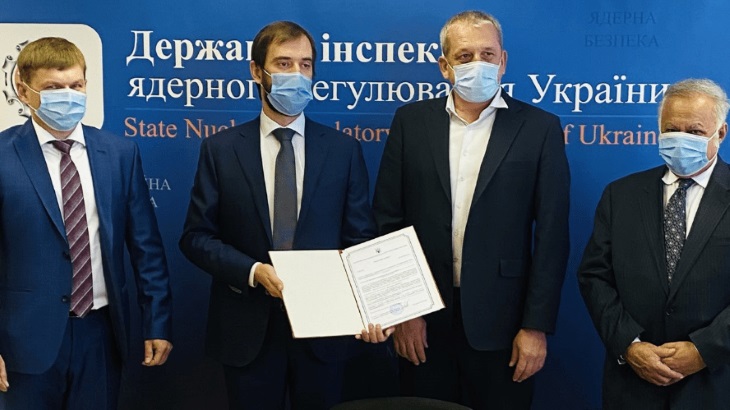Chernobyl used fuel store gains permit for commissioning
09 September 2020
The State Nuclear Regulatory Inspectorate of Ukraine (SNRIU) has issued a permit to SSE Chernobyl Nuclear Power Plant (ChNPP) to start commissioning work at the Chernobyl Interim Spent Nuclear Fuel Storage Facility (ISF-2), which upon loading will be the world's largest dry storage installation.
 From L-R: Sergiy Tarakanov, general director of Holtec Ukraine; Grigoriy Plachkov, SNRIU chairman; Volodymyr Peskov, ChNPP acting general director; Riaz Awan, vice president of Ukraine Operations (Image: Holtec International)
From L-R: Sergiy Tarakanov, general director of Holtec Ukraine; Grigoriy Plachkov, SNRIU chairman; Volodymyr Peskov, ChNPP acting general director; Riaz Awan, vice president of Ukraine Operations (Image: Holtec International)
Announcing the milestone in separate statements yesterday, ChNPP and Holtec International of the USA said the permit initiates the campaign to disassemble each of Chernobyl's more than 21,000 fuel assemblies into three parts - two fuel bundles and an activated connecting rod - in a purpose-built 'hot cell', packaging them in double-walled transportable canisters and placing them into dry storage.
Holtec had handed over the complex to the owner, ChNPP, in December 2019. The permit was issued once the owner had completed the last round of confirmatory component and integral effects tests.
Presenting the permit took place in a small ceremony on 7 September led by the SNRIU Chairman Grigoriy Plachkov and attended by Bogdan Borukhovskiy, deputy minister of the Ministry of Ecology and Natural Resources of Ukraine, Sergiy Kalashnik, head of the State Agency of Ukraine on Exclusion Zone Management, as well as representatives of the European Bank for Reconstruction and Development (EBRD), ChNPP and Holtec.
Speaking at the ceremony, Plachkov said: "This is an important and long-awaited event. The transfer of ChNPP Spent Nuclear Fuel to a long-term safe dry storage at ISF-2 over the next 10 years is one of [the] key milestones in the transformation of the Chernobyl NPP into an ecologically safe system."
Balthasar Lindauer, director of the EBRD's Nuclear Safety Department, added: "Providing safe and secure storage for spent fuel is one of the most pressing nuclear safety challenges at the Chernobyl site. The start of hot testing at the new storage facility is therefore a major milestone. It is credit to the hard work of ChNPP and Holtec in overcoming many technical challenges as well as to the support of the donors to the Nuclear Safety Account. It is now critically important that this nuclear legacy is addressed in a timely and safe manner."
Unrestricted loading of dry storage systems will begin shortly after making the final 'hot' commissioning tests, which began today.
ChNPP thanked the Assembly of Donors, consisting of the governments of Belgium, Canada, Denmark, the European Union, Finland, France, Germany, Italy, Japan, the Netherlands, Norway, Russia, Sweden, Switzerland, Ukraine, the UK and the USA, who provided the financial support, and the Fund Administrator, the EBRD, for its "steadfast support to bring this important and critical project to this final stage".
Holtec said Chernobyl is the world's most complex dry storage project with numerous unique aspects. The use of double-walled canisters to render any risk of leakage "utterly non-credible", and the deployment of a forced gas dehydrator to extract the last trace of entrained moisture from the fuel for guaranteed in-storage safety, are among the many technologies that Holtec said it had deployed "to overcome the challenges that had stymied the project" until 2011, when Holtec took it over.
Researched and written by World Nuclear News